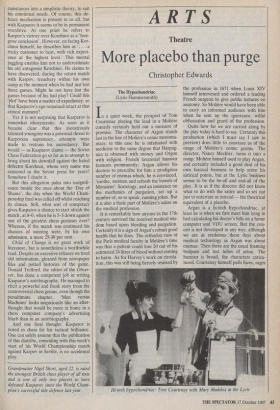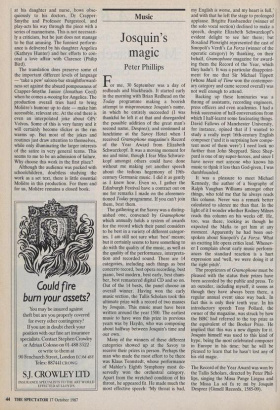ARTS
Theatre
More placebo than purge
Christopher Edwards
The Hypochondriac (Lyric Hammersmith)
In a quiet week, the prospect of Tom Courtenay playing the lead in a Moliere comedy certainly held out a measure of promise. The character of Argan stands last in the line of Moliere's comic monoma- niacs; in this case he is infatuated with medicine to the same degree that Harpag- nan is obsessed with money and Orgon with religion. French lavatorial humour features prominently; Argan allows his doctors to prescribe for him a prodigious number of enemas which, he is convinced, 'soothe, moisten and refresh the bowels of Monsieur'. Scatology, and an insistence on the mechanics of purgation, set up a number of, so to speak, running jokes. But it is also a basic part of Moliere's satire on the medical profession.
It is remarkable how anyone in the 17th century survived the received medical wis- dom based upon bleeding and purgation. Certainly it is a sign of Argan's robust good health that he does. The orthodox view of the Paris medical faculty in Moliere's time was that a patient could lose 20 out of his estimated 24 litres of blood without coming to harm. As for Harvey's work on circula- tion, this was still being fiercely resisted by the profession in 1671 when Louis XIV himself intervened and ordered a leading French surgeon to give public lectures on anatomy. So Moliere would have been able to carry an informed audience with him when he sent up the ignorance, wilful obfuscation and greed of the profession.
Quite how far we are carried along by the play today is hard to say. Certainly this production (which I must say I saw in preview) does little to convince us of the range of Moliere's comic genius. The director, Nancy Meckler, turns it into a romp. Moliere himself used to play Argan, and certainly included a good deal of his own farcical business to help score his satirical points, but at the Lyric business seems to be the be-all and end-all of the play: It is as if the director did not know what to do with the satire and so set out just to entertain us instead — the theatrical equivalent of a placebo.
Argan is a hi-tech hypochondriac, at least he is when we first meet him lying in bed calculating his doctor's bills on a home computer and VDU screen. But the con- ceit is not developed in any way, although we are as credulous these days about medical technology as Argan was about enemas. Then there are the usual foaming bedpans and test tubes of urine. The humour is broad, the characters carica- tured. Courtenay himself pulls faces, rages Hi-tech hypochondriac: Torn Courtenay with Mary Maddox at the Lyric at his daughter and nurse, bows obse- quiously to his doctors, Dr Crapper- Smythe and Professor Purgestool, and play-acts his way through the piece with a series of mannerisms. This is not necessari- ly a criticism, but he just does not manage to be that amusing. The funniest perform- ance is delivered by his daughter Angelica (Kathryn Hunter) and her efforts to con- ceal a love affair with Clarence (Philip Bird).
The translation does preserve some of the important different levels of language — 'take a pew' saloon-bar straightforward- ness set against the absurd pompousness of Crapper-Smythe Junior (Jonathan Cecil) when he comes a-wooing for Angelica. The production overall tries hard to bring Moliere's humour up to date — make him accessible, relevant etc. At the end there is even an interpolated joke about GPs' Volvos. Some of this is very funny and it will certainly become slicker as the run warms up. But most of the jokes and routines just draw attention to themselves, while only illuminating the larger interests of the satire in very general terms. This seems to me to be an admission of failure. Why choose this work in the first place?
Although the audience was packed with schoolchildren, doubtless studying the work as a set text, there is little essential Moliere in this production. For them and for us, Moliere remains a closed book.



























































 Previous page
Previous page